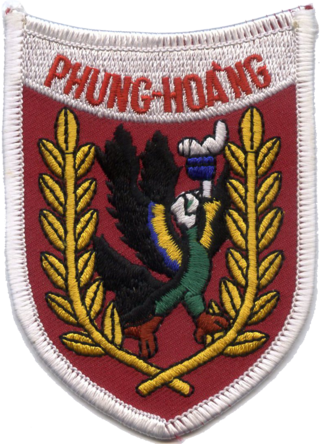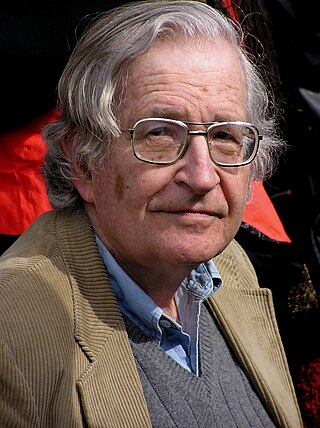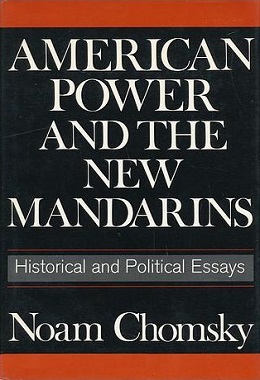Related Research Articles

Agent Orange is a chemical herbicide and defoliant, one of the tactical use Rainbow Herbicides. It was used by the U.S. military as part of its herbicidal warfare program, Operation Ranch Hand, during the Vietnam War from 1961 to 1971. The U.S. was strongly influenced by the British who used Agent Orange during the Malayan Emergency. It is a mixture of equal parts of two herbicides, 2,4,5-T and 2,4-D. In addition to its damaging environmental effects, traces of dioxin found in the mixture have caused major health problems and deformities for many individuals who were exposed, and their children.

Avram Noam Chomsky is an American professor and public intellectual known for his work in linguistics, political activism, and social criticism. Sometimes called "the father of modern linguistics", Chomsky is also a major figure in analytic philosophy and one of the founders of the field of cognitive science. He is a laureate professor of linguistics at the University of Arizona and an institute professor emeritus at the Massachusetts Institute of Technology (MIT). Among the most cited living authors, Chomsky has written more than 150 books on topics such as linguistics, war, and politics. In addition to his work in linguistics, since the 1960s Chomsky has been an influential voice on the American left as a consistent critic of U.S. foreign policy, contemporary capitalism, and corporate influence on political institutions and the media.

The Vietnam War was a conflict in Vietnam, Laos, and Cambodia from 1 November 1955 to the fall of Saigon on 30 April 1975. It was the second of the Indochina Wars and a major conflict of the Cold War. While the war was officially fought between North Vietnam and South Vietnam, the north was supported by the Soviet Union, China, and other countries in the Eastern Bloc, while the south was supported by the US and anti-communist allies. This made it a proxy war between the US and Soviet Union. It lasted almost 20 years, with direct US military involvement ending in 1973. The conflict spilled into the Laotian and Cambodian civil wars, which ended with all three countries becoming communist in 1975.

The "Clash of Civilizations" is a thesis that people's cultural and religious identities will be the primary source of conflict in the post–Cold War world. The American political scientist Samuel P. Huntington argued that future wars would be fought not between countries, but between cultures. It was proposed in a 1992 lecture at the American Enterprise Institute, which was then developed in a 1993 Foreign Affairs article titled "The Clash of Civilizations?", in response to his former student Francis Fukuyama's 1992 book The End of History and the Last Man. Huntington later expanded his thesis in a 1996 book The Clash of Civilizations and the Remaking of World Order.
The domino theory is a geopolitical theory which posits that changes in the political structure of one country tend to spread to neighboring countries in a domino effect. It was prominent in the United States from the 1950s to the 1980s in the context of the Cold War, suggesting that if one country in a region came under the influence of communism, then the surrounding countries would follow. It was used by successive United States administrations during the Cold War as justification for American intervention around the world. U.S. President Dwight D. Eisenhower described the theory during a news conference on April 7, 1954, when referring to communism in Indochina as follows:
Finally, you have broader considerations that might follow what you would call the "falling domino" principle. You have a row of dominoes set up, you knock over the first one, and what will happen to the last one is the certainty that it will go over very quickly. So you could have a beginning of a disintegration that would have the most profound influences.

Samuel Phillips Huntington was an American political scientist, adviser, and academic. He spent more than half a century at Harvard University, where he was director of Harvard's Center for International Affairs and the Albert J. Weatherhead III University Professor.

Foreign Affairs is an American magazine of international relations and U.S. foreign policy published by the Council on Foreign Relations, a nonprofit, nonpartisan, membership organization and think tank specializing in U.S. foreign policy and international affairs. Founded on 15 September 1922, the print magazine is published every two months, while the website publishes articles daily and anthologies every other month.

Hegemony or Survival: America's Quest for Global Dominance is a book about the United States and its foreign policy written by American political activist and linguist Noam Chomsky. It was first published in the United States in November 2003 by Metropolitan Books and then in the United Kingdom by Penguin Books. It was republished by Haymarket Books in January 2024.
Edward Samuel Herman was an American economist, media scholar and social critic. Herman is known for his media criticism, in particular the propaganda model hypothesis he developed with Noam Chomsky, a frequent co-writer. He held an appointment as Professor Emeritus of finance at the Wharton School of Business of the University of Pennsylvania. He also taught at Annenberg School for Communication at the University of Pennsylvania.

The Phoenix Program was designed and initially coordinated by the United States Central Intelligence Agency (CIA) during the Vietnam War, involving the American, South Vietnamese militaries, and a small amount of Special forces operatives from the Australian Army Training Team Vietnam. In 1970, CIA responsibility was phased out, and the program was put under the authority of the Civil Operations and Revolutionary Development Support (CORDS).

Opposition to United States involvement in the Vietnam War began in 1965 with demonstrations against the escalating role of the United States in the war. Over the next several years, these demonstrations grew into a social movement which was incorporated into the broader counterculture of the 1960s.
Clarence Crane Brinton was an American historian of France, as well as a historian of ideas. His most famous work, The Anatomy of Revolution (1938) likened the dynamics of revolutionary movements to the progress of fever.

Noam Chomsky is an intellectual, political activist, and critic of the foreign policy of the United States and other governments. Noam Chomsky describes himself as an anarcho-syndicalist and libertarian socialist, and is considered to be a key intellectual figure within the left wing of politics of the United States.
Economic warfare or economic war is an economic strategy used by belligerent states with the goal of weakening the economy of other states. This is primarily achieved by the use of economic blockades. Ravaging the crops of the enemy is a classic method, used for thousands of years.

With his famous book Political Order in Changing Societies, published in 1968, the American political scientist and Harvard professor Samuel P. Huntington is considered to be one of the ”Founding Fathers” of neo-institutionalism, the historical institutionalism. The book is dealing with the role of political institutions in changing political systems. Huntington stated that ”the most important political distinction among countries concerns not their form of government but their degree of government”. As stated by Francis Fukuyama, Huntington argued that political decay was "at least as likely as political development", and that neither "economic nor social development" could proceed without political order, the actual experience of newly independent countries being "one of increasing social and political disorder".

"Objectivity and Liberal Scholarship" is an essay by the American academic Noam Chomsky. It was first published as part of Chomsky's American Power and the New Mandarins. Parts of the essay were delivered as a lecture at New York University in March 1968, as part of Albert Schweitzer Lecture Series. The first third of the essay, "The Menace of Liberal Scholarship" by Noam Chomsky in The New York Review of Books, January 2, 1969, was taken "almost verbatim" from this essay.

American Power and the New Mandarins is a book by American academic Noam Chomsky. Largely written in 1968 and published in 1969, it was his first text focused on politics and sets out in detail his opposition to U.S. involvement in the Vietnam War.

A barracks ship or barracks barge or berthing barge, or in civilian use accommodation vessel or accommodation ship, is a ship or a non-self-propelled barge containing a superstructure of a type suitable for use as a temporary barracks for sailors or other military personnel. A barracks ship, a military form of a dormitory ship, may also be used as a receiving unit for sailors who need temporary residence prior to being assigned to their ship. The United States Navy used to call them Yard Repair Berthing and Messing with designations YRBM and YRBM(L) and now classes them as either Auxiliary Personnel Barracks (APB) or Auxiliary Personnel Lighter (aka barge) (APL).

Carol Doris Chomsky was an American linguist and education specialist who studied language acquisition in children.

Cambodian genocide denial is the belief expressed by some academics that early claims of atrocities committed by the Khmer Rouge government (1975–1979) in Cambodia were much exaggerated. Many scholars of Cambodia and intellectuals opposed to the US involvement in the Vietnam War denied or minimized reports of human rights abuses of the Khmer Rouge, characterizing contrary reports as "tales told by refugees" and US propaganda. They viewed the assumption of power by the Communist Party of Kampuchea as a positive development for the people of Cambodia who had been severely impacted by the Vietnam War and the Cambodian Civil War. On the other side of the argument, anti-communists in the United States and elsewhere saw in the rule of the Khmer Rouge vindication of their belief that the victory of Communist governments in Southeast Asia would lead to a "bloodbath."
References
- ↑ Huntington, Samuel P. (July 1968). "The Bases of Accommodation". Foreign Affairs. 46 (4): 642–656. doi:10.2307/20039333. JSTOR 20039333.
- ↑ Lazare, Daniel (May 27, 2004). "Diversity and Its Discontents". The Nation. Retrieved 25 December 2009.
- ↑ "A Frustrating Task: Noam Chomsky debates with Samuel Huntington". New York Review of Books (online copy at chomsky.info). February 26, 1970. Archived from the original on 13 July 2013. Retrieved 25 December 2009.